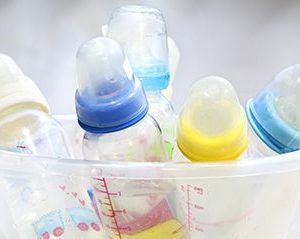- Could Artificial Sweeteners Be Aging the Brain Faster?
- Techniques for Soothing Your Nervous System
- Does the Water in Your House Smell Funny? Here’s Why
- Can a Daily Dose of Apple Cider Vinegar Actually Aid Weight Loss?
- 6 Health Beverages That Can Actually Spike Your Blood Sugar
- Treatment Options for Social Anxiety Disorder
- Understanding the Connection Between Anxiety and Depression
- How Daily Prunes Can Influence Cholesterol and Inflammation
- When to Take B12 for Better Absorption and Energy
- Epsom Salts: Health Benefits and Uses
What You Need to Know About the Infant Formula Recall

If you’re a parent using Similac, Alimentum or EleCare infant formulas, here’s updated facts on the ongoing product recall.
As the U.S. Food and Drug Administration investigates, Abbott Nutrition has recalled certain powdered formulas made at its Sturgis, Mich., facility. The products have been linked to bacterial infections in five babies. All had to be hospitalized and two died, possibly due to their infections. The illnesses occurred in Minnesota, Ohio and Texas between Sept. 16, 2021, and Jan. 4, 2022.
The recalled formula products were sold across the United States and in some other countries, according to the FDA. To identify them, look at the lot code, a multidigit number on the bottom of the container.
Do not use products if:
- The first two digits of the code are 22 through 37.
- The code on the container contains K8, SH or Z2.
- The expiration date is 4-1-2022 (APR 2022) or later.
- In addition to these products, Abbott Nutrition has recalled Similac PM 60/40 with a lot code of 27032K80 (can) / 27032K800 (case).
You can also go to the company’s website and enter the lot code of products you have to see if they are included in the recall.
The five reported cases of bacterial infections include four involving Cronobacter sakazakii, and of Salmonella Newport.
Cronobacter bacteria can cause severe, life-threatening infections (sepsis) or meningitis (an inflammation of the membranes that protect the brain and spine). Cronobacter infections are rare but are especially high risk for newborns, the FDA said.
Salmonella can cause gastrointestinal illness and fever called salmonellosis.
Symptoms of Cronobacter and Salmonella infection include: poor feeding, irritability, temperature changes, jaundice, grunting breaths, abnormal body movements, lethargy, rash or blood in the urine or stool.
If your infant is experiencing such symptoms, contact your child’s health care provider to report them and to receive immediate care, the FDA advised.
Infant formula is the only source of nutrition for many newborns and infants, and the recall may affect the availability of certain types of infant formula, the agency noted.
It said it is working with Abbott Nutrition on the safe resumption of production in Sturgis, assessing production capacity at other Abbott facilities and asking other infant formula makers about their production capacity.
The FDA said parents and caregivers should not make or feed homemade formula to infants, because recipes for them have not been evaluated by the agency and may lack nutrients vital to an infant’s growth.
If your regular formula is not available, contact your child’s health care provider for recommendations on changing feeding practices, the FDA said.
If you get infant formula through WIC (the Special Supplemental Nutrition Program for Women, Infants, and Children), do not throw the formula out.
Instead, take it to the store for a refund/exchange or call Abbott Nutrition at 800-986-8540. WIC recipients should be able to obtain a different brand of similar formula. Contact your local WIC clinic for further assistance, the FDA said.
More information
For more on infant formula, go to the American Academy of Pediatrics.
SOURCE: U.S. Food and Drug Administration, news release, Feb. 28, 2022
Source: HealthDay
Copyright © 2026 HealthDay. All rights reserved.










